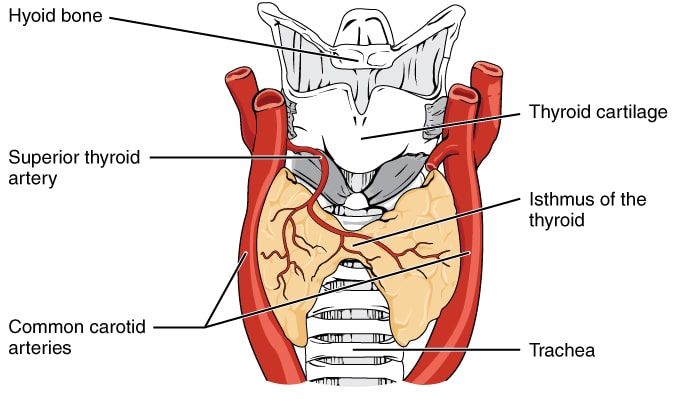
Thyroid Gland: How to Balance Its Hormones

The thyroid gland is a small, butterfly-shaped organ located at the base of the neck—but its role in maintaining overall health is anything but small. Millions of people around the world, including a significant number in the United States, suffer from thyroid disorders, many without even knowing it. Understanding how this powerful gland functions, especially in relation to metabolism and weight regulation, is key to maintaining long-term well-being and preventing avoidable health complications.
In this guide, you’ll learn how the thyroid works, how to recognize the signs of dysfunction, and what practical steps you can take to support its health naturally.
How Does the Thyroid Gland Function?

The thyroid gland produces hormones—primarily T3 (triiodothyronine) and T4 (thyroxine)—that control your metabolism, the rate at which your body uses energy. These hormones influence nearly every major organ system, impacting:
-
Heart rate
-
Body temperature
-
Cholesterol levels
-
Muscle strength
-
Skin and hair health
-
Memory and mood
-
Weight management
-
Energy levels
When the thyroid underperforms (a condition known as hypothyroidism), these systems begin to slow down. This can lead to symptoms such as:
-
Persistent fatigue
-
Weight gain
-
Dry or flaky skin
-
Hair thinning or loss
-
Sluggish digestion
-
Depression or mood swings
-
Difficulty concentrating
Even mild thyroid dysfunction can significantly affect quality of life.
Common Signs of Hypothyroidism You Shouldn't Ignore
Many people with hypothyroidism may show only subtle symptoms—or none at all. Still, if you notice two or more of the following signs consistently, it’s important to consult your healthcare provider for a proper diagnosis:
1. Constantly Feeling Cold
While feeling chilly in winter is normal, feeling cold even in warm environments may suggest your thyroid is underactive. Your metabolism slows down with reduced thyroid hormone levels, affecting your body’s ability to regulate temperature.
2. Dry Skin and Brittle Hair
Are you noticing dry, flaky patches on your skin or hair that feels thin and breaks easily? These are often early indicators of a thyroid issue. In some cases, you may also see hair loss, especially at the eyebrows or scalp.
3. Unexplained Fatigue
Everyone gets tired now and then, but if you experience persistent exhaustion, even after a full night’s sleep, it could point to thyroid dysfunction. This fatigue is often deeper and more chronic than regular tiredness.
4. Brain Fog and Poor Memory
Cognitive symptoms like memory lapses, difficulty focusing, or mental fatigue may be tied to low thyroid hormone levels. Many patients report feeling like they are “in a fog” or can’t think as clearly as before.
What Causes the Thyroid to Slow Down?
Several factors can disrupt thyroid hormone production or conversion. Recognizing these triggers can help you take proactive steps to protect your thyroid:
-
Autoimmune conditions like Hashimoto’s thyroiditis can cause the immune system to attack the thyroid gland.
-
Exposure to toxins, such as high levels of mercury or fluoride, can impair thyroid function.
-
Chronic stress increases cortisol, which interferes with the conversion of T4 to the more active T3.
-
Diets high in soy, processed foods, or refined sugar can negatively impact hormone balance.
-
Nutrient deficiencies, especially in iodine, selenium, and zinc, can prevent optimal thyroid function.
By understanding and addressing these potential triggers, you can support your thyroid and overall hormonal health.
How to Naturally Support and Boost Thyroid Function

If you suspect that your thyroid isn’t working as efficiently as it should, there are several steps you can take to start healing naturally:
1. Eliminate Thyroid Disruptors (First 14 Days)
Begin by avoiding common thyroid-disrupting foods and substances such as:
-
Flaxseed oil
-
Peanuts
-
Corn
-
Alcohol
-
Caffeine
-
High-mercury fish (like tuna or swordfish)
These can contribute to inflammation or interfere with hormone production and should be removed during a 14-day reset.
2. Focus on Anti-Inflammatory Nutrition
Replace those foods with thyroid-friendly options like:
-
Leafy greens and cruciferous vegetables (cooked if needed)
-
Fresh fruits rich in antioxidants
-
Healthy fats from avocados, nuts, and seeds
-
Low-mercury fish like salmon or sardines
-
Eggs (rich in iodine and selenium)
-
Natural sweeteners like honey or stevia (in moderation)
3. Don’t Starve Your Thyroid
If you’re watching your weight, be cautious not to drastically cut calories. A weekly cheat meal can actually help stimulate metabolism and prevent your thyroid from slowing down due to perceived starvation.
4. Manage Stress and Sleep
Thyroid function is deeply linked to your adrenal glands and stress response. Prioritize quality sleep, practice mindfulness, and reduce stress with activities like walking, journaling, or yoga.
Final Thoughts: Listen to Your Body
Your thyroid is one of the most sensitive yet essential organs in your body. While its symptoms can be vague and easily mistaken for other issues, early detection and lifestyle changes can make a significant difference in your energy, weight, mood, and long-term health.
Have you ever dealt with thyroid issues? What worked for you?
We’d love to hear your experience—share your story and help others better understand this often-overlooked condition.
News in the same category


Navigating the Horizon: The Future of EGFR-Mutated Advanced NSCLC Management

Hot Coffee or Iced Coffee: Which Is Better for Your Health?

Advancing COPD Care: Precision Medicine, Symptom Recognition, and Patient Empowerment

Can Transcutaneous Auricular Vagus Nerve Stimulation Reduce Pain in Erosive Hand Osteoarthritis?

How Brewing Coffee the Right Way May Help Reduce Visceral Fat

The Impact of Emulsifiers in Ultra-Processed Foods on Gastrointestinal Health

Two Ideal Times to Eat Sweet Potatoes for Safe Weight Loss and Stable Blood Sugar

9 Early Warning Signs of Lung Cancer You Should Not Ignore

Four Vegetables That Help Protect the Body Against Cancer Cell Damage

Foods to Eat if You Need to Poop – The Best Natural Laxatives to Relieve Constipation

Home Remedies to Get Rid Of Ingrown Toenails (Onychocryptosis)

Bloated Stomach: 8 Common Reasons and How to Treat Them (Evidence Based)

5 Healthiest Lunch Meats for Sandwiches and Snacks

25-Year-Old Woman Who Overcame Liver Cancer: “5 Foods You Must Avoid No Matter How Much You Crave Them”

Doctors Warn: Four Types of Inflammation That Can Turn Into Cancer Within a Year if Treatment Is Delayed

Can Anti-Inflammatory Topical Therapy Fill the Treatment Gap in Mild Hidradenitis Suppurativa?

New Dietary Guidelines Urge Americans to Eat More Meat and Whole-Fat Dairy

What Happens to Your Body When You Eat Peanut Butter Every Day

10 Snacks That Can Help Lower Your Cholesterol Naturally
News Post

Morning Urine Warning Signs That Should Not Be Ignored

Navigating the Horizon: The Future of EGFR-Mutated Advanced NSCLC Management

Hot Coffee or Iced Coffee: Which Is Better for Your Health?

Advancing COPD Care: Precision Medicine, Symptom Recognition, and Patient Empowerment

Can Transcutaneous Auricular Vagus Nerve Stimulation Reduce Pain in Erosive Hand Osteoarthritis?

How Brewing Coffee the Right Way May Help Reduce Visceral Fat

The Impact of Emulsifiers in Ultra-Processed Foods on Gastrointestinal Health

Two Ideal Times to Eat Sweet Potatoes for Safe Weight Loss and Stable Blood Sugar

9 Early Warning Signs of Lung Cancer You Should Not Ignore

Four Vegetables That Help Protect the Body Against Cancer Cell Damage

Most do this wrong. 10 bathroom habits you’re doing wrong

Flex Alexander Reflects on Role as Michael Jackson in 2004 Biopic, Says Singer Hated the Film

Brian McKnight Allegedly Rejected Dying Son Niko's Plea For Love

Cary-Hiroyuki Tagawa Dies: ‘Mortal Kombat’, ‘Last Emperor’ & ‘Man In The High Castle’ Actor Was 75

Ray J Accused of Owing 6-Figure Debt Days Before Arrest Over Alleged Threats to Ex Princess (Exclusive)

DJ Quik’s Son Convicted of 2022 Murder

Plantago Lanceolata: Powerful Health Benefits, Medicinal Uses, and Natural Remedies

Benefits and Uses of Taro (Colocasia esculenta)

9 Things About Bledo Blanco (Amaranthus albus)
